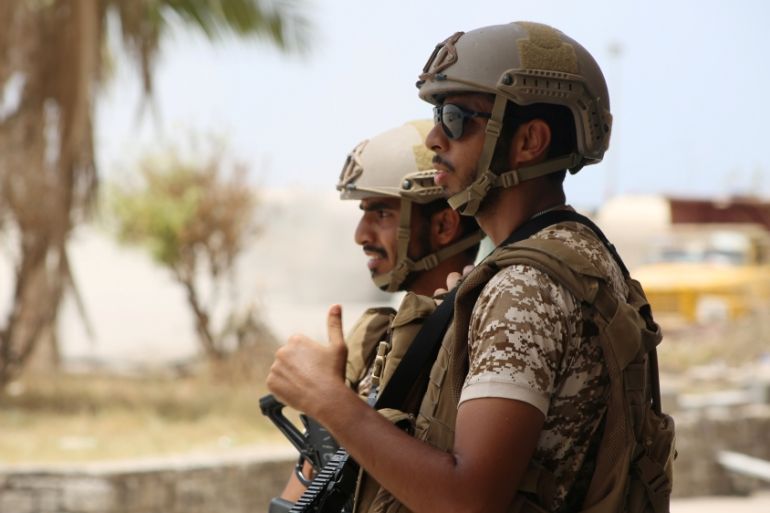HRW: UAE backs torture and disappearances in Yemen
Rights group says United Arab Emirates forcibly disappears people, operates secret prisons, and backs torture in Yemen.

A human rights group has accused the United Arab Emirates of backing the torture and disappearances of dozens of people in Yemen.
Human Rights Watch (HRW) said on Thursday that the UAE financed, armed and trained Yemeni forces responsible for grave human rights violations during security operations against the Yemeni branches of al-Qaeda and ISIL.
According to the rights group, the UAE operates two of 11 secret prisons in southern Yemen, and its officials have forcibly disappeared people and ordered the continued detention of others despite release orders.
|
|
In a separate investigation, the Associated Press said it has documented at least 18 secret prisons in the southern governorates of Aden and Hadramawt.
Torture was rife in these informal lockups, and included heavy beatings, sexual assault and threats to detainees and their family members, the HRW and AP said.
They said their investigations was based on interviews with former detainees, families of detainees, lawyers and Yemeni government officials.
The HRW and AP also said UAE may have moved some detainees across the Red Sea to a base in Eritrea.
UAE’s government has denied allegations to AP, saying: “There are no secret detention centres and no torture of prisoners is done during interrogations.”
‘No-return prison’
The UAE is part of a Saudi-led, US-backed coalition formed to help Yemen’s government to fight Shia rebels known as Houthis, who overran the north of the country in 2014.
The coalition is also helping the US target Yemeni branches of the al-Qaeda and the Islamic State of Iraq and the Levant (ISIL, also known as ISIS).
HRW said it has documented abuses by UAE-backed “Security Belt” forces in Aden and the “Hadrami Elite Forces” in Hadramawt.
The rights group said it has documented the cases of 49 people, including children, who were detained arbitrarily or forcibly disappeared by these forces over the last year.
READ MORE: A recollection of Yemen’s Ramadan spirit
Former detainees described one clandestine prison in Aden as a “no-return prison”, HRW said.
One man who was able to visit a detained relative, a child, in Aden told HRW that the boy “looked insane” when he emerged from a cell. He reportedly disappeared from the centre later.
AP reported that the 18 secret prisons it had documented were either hidden or off limits to Yemen’s government.
![Former detainees told AP of horrific abuse inside secret prisons in Yemen [Maad El Zikry/AP]](/wp-content/uploads/2017/06/977f332d3e354596932097a7bff62dae_18.jpeg)
The prisons are reportedly inside military bases, ports, an airport, private villas and even a nightclub.
“We could hear the screams,” a former detainee held for six months at Riyan airport in the city of Mukalla in Hadramawt told AP.
“The entire place is gripped by fear. Almost everyone is sick, the rest are near death. Anyone who complains heads directly to the torture chamber.”
Other people who were released from the prison told AP of being crammed into shipping containers smeared with faeces, and being tied to a spit like a roast and spun in a circle of fire.
Citing anonymous US defence officials, the news agency said the senior US military leaders were aware of allegations of torture, a claim the defence department denied.
Release orders
Families of detainees have held near-weekly protests in Yemen seeking information about missing sons, brothers and fathers.
In Aden, activists, lawyers and government officials told HRW that Security Belt officers claimed they were following UAE orders in detaining suspects and could not release detainees without UAE permission.
New #AQAP #Yemen film "Repelling Aggression 7" shows angry women protesting forced disappearance of their men by #UAE supported forces 2/3 pic.twitter.com/3cqPafs6LE
— Elisabeth Kendall (@Dr_E_Kendall) May 2, 2017
The prosecutor’s office in Aden has issued release orders for dozens of people, but the orders are often not respected, the HRW said.
“You don’t effectively fight extremist groups like al-Qaeda or ISIS by disappearing dozens of young men and constantly adding to the number of families with ‘missing’ loved ones in Yemen,” Sarah Leah Whitson, Middle East director at HRW, said.
“The UAE and its partners should place protecting detainee rights at the centre of their security campaigns if they care about Yemen’s long-term stability.”
READ MORE: Who benefits from a weak and divided Yemen?
HRW said Houthi forces and fighters loyal to former President Ali Abdullah Saleh have also arbitrarily detained and disappeared scores of people in northern Yemen.
The war in Yemen, the poorest country in the Arab world, has killed more than 10,000 people, displaced more than three million and ruined much of the impoverished country’s infrastructure.
In March, the UN World Food Programme said that nearly half of Yemen’s 22 provinces were on the verge of famine.
In recent weeks, more than 900 people have died of cholera in the second outbreak of the deadly infection in less than a year.